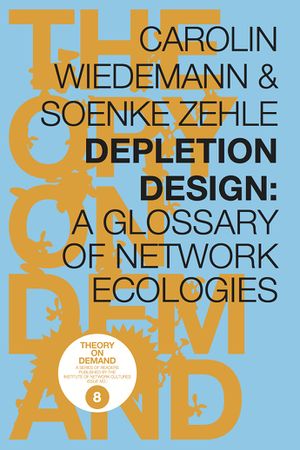Diferencia entre revisiones de «Carolin Wiedemann, Soenke Zehle (2012) Depletion Design: A Glossary of Network Ecologies»
(Página creada con «'''Carolin Wiedemann, Soenke Zehle (2012). ''Depletion Design: A Glossary of Network Ecologies.''Amsterdam:Institute of Network Cultures.''' Enlace:http://networkcultures....») |
|||
| (No se muestran 7 ediciones intermedias de 3 usuarios) | |||
| Línea 1: | Línea 1: | ||
| − | + | [[Archivo:DEPLETION_DESIGN-img.jpg | miniaturadeimagen | derecha]] | |
| − | + | == <small>'''Resumen'''</small> == | |
| − | + | ''Depletion Design'' suggests that ideas of exhaustion cut across cultural, environmentalist, and political idioms and offers ways to explore the emergence of new material assemblages. We, or so we are told, are running out of time, of time to develop alternatives to a new politics of emergency, as constant crisis has exhausted the means of a politics of representation too slow for the state of exception, too ignorant of the distribution of political agency, too focused on the governability of financial architectures. But new forms of individual and collective agency already emerge, as we learn to live, love, work within the horizon of depletion, to ask what it means to sustain ourselves, each other, again. Of these and other knowledges so created, there can no longer be an encyclopedia; a glossary, perhaps. | |
| − | + | == <small>'''Archivo'''</small> == | |
| + | |||
| + | [[Archivo: DEPLETION_DESIGN.pdf]] | ||
| + | |||
| + | == <small>'''Fuente'''</small> == | ||
| + | |||
| + | [[Institute_of_Network_Cultures | Institute of Network Cultures]] | ||
| + | |||
| + | == <small>'''Enlaces'''</small> == | ||
| + | |||
| + | '''URL:''' http://networkcultures.org/blog/publication/no-8-depletion-design-a-glossary-of-network-ecologies-2/# | ||
| + | |||
| + | '''Wayback Machine:''' https://web.archive.org/web/*/http://networkcultures.org/blog/publication/no-8-depletion-design-a-glossary-of-network-ecologies-2/# | ||
[[Categoría:Biblioteca]] | [[Categoría:Biblioteca]] | ||
| − | [[Categoría:Institute of | + | [[Categoría:Open source hardware]] |
| + | [[Categoría:Open source software]] | ||
| + | [[Categoría:Hackerspace]] | ||
| + | [[Categoría:Institute of Network Cultures]] | ||
[[Categoría:Carolin Wiedemann]] | [[Categoría:Carolin Wiedemann]] | ||
[[Categoría:Soenke Zehle]] | [[Categoría:Soenke Zehle]] | ||
Revisión actual del 22:31 3 dic 2021
Resumen
Depletion Design suggests that ideas of exhaustion cut across cultural, environmentalist, and political idioms and offers ways to explore the emergence of new material assemblages. We, or so we are told, are running out of time, of time to develop alternatives to a new politics of emergency, as constant crisis has exhausted the means of a politics of representation too slow for the state of exception, too ignorant of the distribution of political agency, too focused on the governability of financial architectures. But new forms of individual and collective agency already emerge, as we learn to live, love, work within the horizon of depletion, to ask what it means to sustain ourselves, each other, again. Of these and other knowledges so created, there can no longer be an encyclopedia; a glossary, perhaps.
Archivo
Fuente
Enlaces
Wayback Machine: https://web.archive.org/web/*/http://networkcultures.org/blog/publication/no-8-depletion-design-a-glossary-of-network-ecologies-2/#
